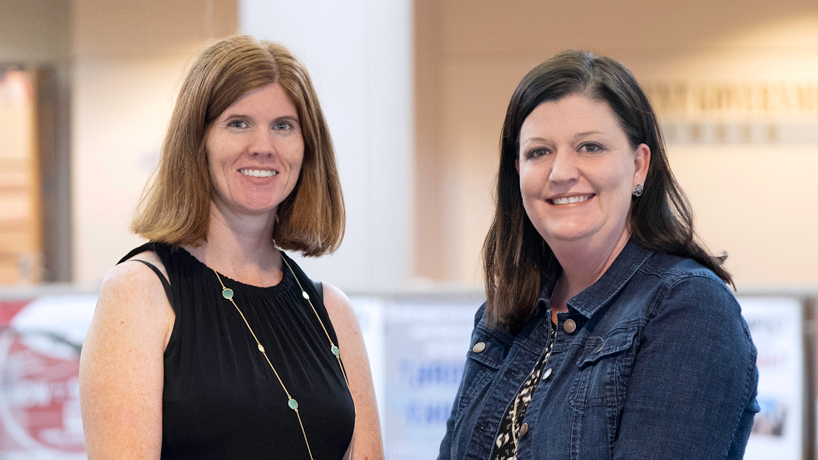
Courtney McDermott (at left), assistant director of field education for the School of Social Work, believes hands-on practicum work is where the rubber hits the road for students like Christy Horton (at right), who has volunteered for several social work organizations in the St. Louis area during her studies at UMSL. (Photo by August Jennewein)
Christy Horton doesn’t hesitate in putting her passion for helping youth to good use.
The University of Missouri–St. Louis social work student serves on the board of directors at Niños de Mexico, advises adoption decisions at Bethany Christian Services St. Louis and acts as a respite caregiver for Boys Hope Girls Hope.
Though each volunteer opportunity has given her a chance to influence organizational policy and give hands-on care to those in need, the Path to Racial Equity Baseline Assessment, part of her practicum at Covenant House Missouri, hits closest to home.
Made possible by two Council on Social Work Education grants totaling $13,247, the assessment aims to open a dialogue about racial tensions in St. Louis and specifically equip local social workers with the tools to effect lasting change.
This goal is especially pertinent to Horton, as she knows Biruk, her 10-year-old son who was adopted from Ethiopia, may face challenges because of his race and culture.
“Biruk has given me a lot of push to further racial equity and involve everyone in the conversation,” she said. “It’s very hard to be competent in someone else’s culture, but an effective social worker must have an awareness that not everybody has grown up and had the same experiences. I think people walk around with blinders on without even realizing it.”
UMSL’s Courtney McDermott, an assistant teaching professor in the School of Social Work, secured the CSWE funding and developed the Path to Racial Equity Baseline Assessment in collaboration with Kira Banks, a Saint Louis University psychology professor. By outlining 10 steps to racial equity for regional social work agencies, the assessment gives motivated students like Horton an avenue to work for enacting change within social work agencies.
“Policy at the state, national and organizational level impacts our clients, so we have to pay attention to what’s going on,” McDermott said. “The events in Ferguson acted as catalysts to find funding and a way to get people to really understand the intersection between policy, race and poverty. Social work students will be working with a lot of disenfranchised communities, and they have to see how systems have impacted citizens their entire lives.”
Alongside the Path to Racial Equity Baseline Assessment, McDermott also secured a $9,892 community engagement grant from CSWE to provide seminars concerning these topics.
On Sept. 30 Horton attended a presentation given by members of the Ferguson Commission. In an open forum, attendees and commission members considered how the Ferguson Report recommendations would affect communities. Horton found the open dialogue to be both necessary and refreshing.
“Race is obviously a sensitive topic, and we’re going to have uncomfortable conversations about discrimination and privilege, but it has to be done,” she said. “Although racial disparity is not a problem that’ll be solved quickly, I’m excited to be a part of Professor McDermott’s pilot program.”
Horton describes McDermott as “friendly and fun” and believes that a new focus on using policy in the field will give social work students the skill set to impact agencies on a deeper level.
McDermott hopes the projects will help social work students deepen their understanding of the policies that define early childhood education, anti-poverty programs, Medicaid, police reform and a range of other initiatives.
“In the social work profession, we need to be talking about what people’s truths are and privilege,” McDermott said. “Just because it doesn’t happen to me, doesn’t mean I shouldn’t believe you. And even though it can get ugly, and some people don’t want to hear the reality of racism, they have to learn how to listen, and say, ‘I believe you because you’re another human.’ At the end of the day, these are hard discussion to have, but they don’t need to be.”
And at the heart of difficult conversations, Horton refocuses on her commitment to her children.
“Racial inequities have existed in American systems for a long time. We need to wake up to that and own that,” said Horton. “My son is African American, and I don’t want him to be set up to not have the opportunities that my biological son does. I want people to realize that equity is about nothing more than leveling the playing field.”















